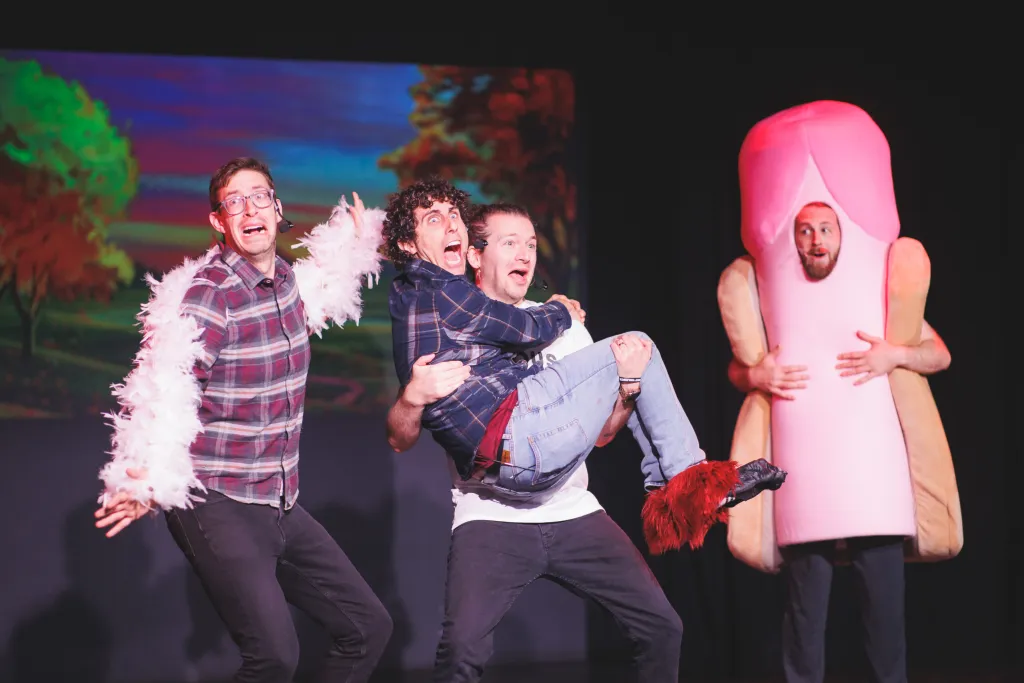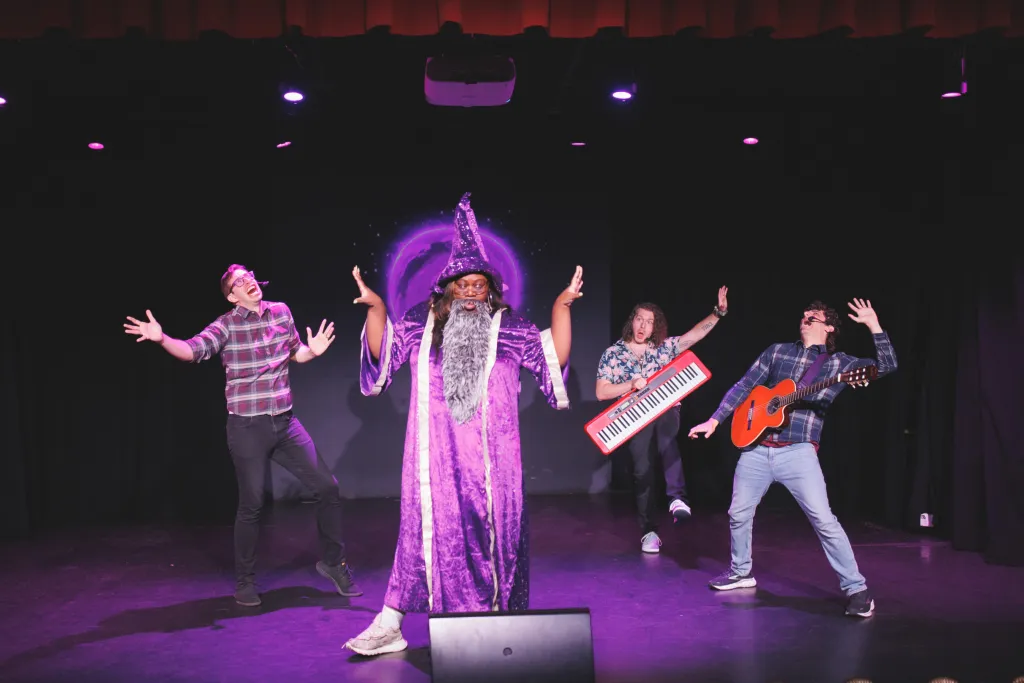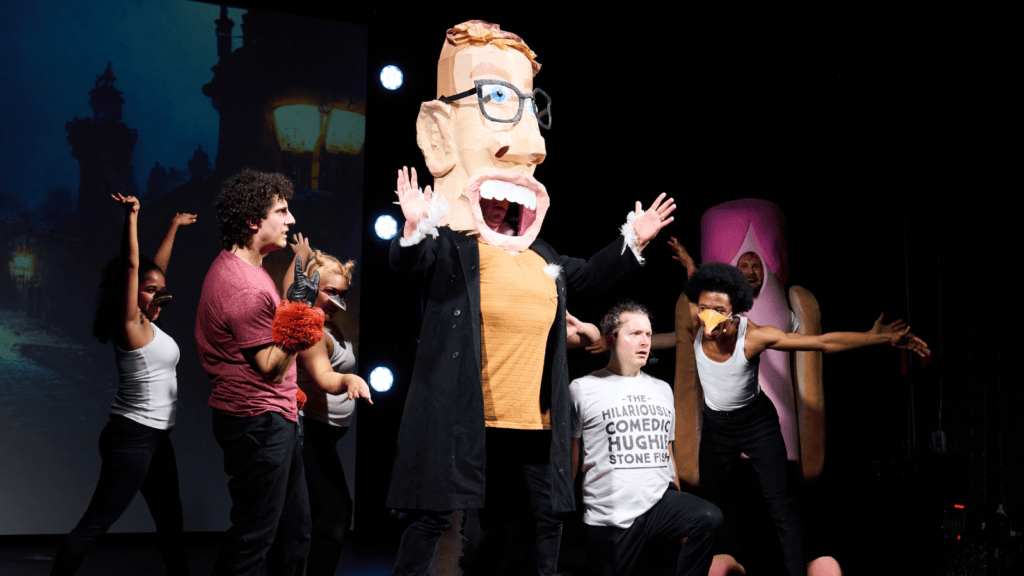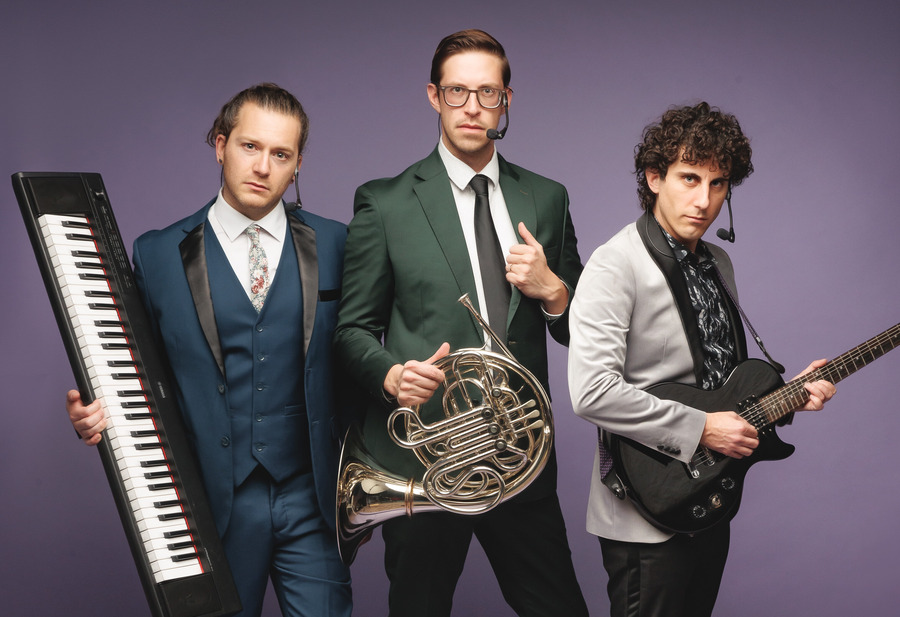What’s a Lewberger? If you answered a three-man comedy band sandwiched together to fit in a single Zoom window, you’d be right. Or at least that’s how I met them earlier this month, a few days after opening night. But unlike toddlers stacked in a trench coat, or some kind of three-headed Hydra, Hughie, Alex, and Keith are all independently talented. Keith Habersberger is a founding member of YouTube’s popular The Try Guys and executive producer of their media company, 2nd Try LLC; Hughie Stone Fish is an Emmy-winning songwriter and co-founder of The Arts Project Syracuse (TAPS); and Alex Lewis is an actor, musician, and comedian with roles in All About Nina, Valley Girl, and The Lincoln Lawyer.
Together, they form a comedy band that has appeared on America’s Got Talent and were finalists on NBC’s Bring The Funny. They’ve had a comedy special (Lewberger: Live at Lincoln Hall) and do a podcast (Celebrity Theme Song) but now they’re live onstage in New York, in Lewberger & The Wizard of Friendship, in a sold-out run on Theatre Row this month. Though they aren’t complete theatre novices—Keith majored in theatre at Illinois State University, Hughie studied songwriting at Berklee College of Music, and Alex can apparently tap dance—they are certainly new to the New York theatre scene. With sharpened skills, approximately $200,000, and the help of some new friends, like co-producer Steven Brandon and choreographer Nico DeJesus, they’ve been able to put their Lewberger stamp on an Off-Broadway stage. Along the way they’ve even been singing showtunes on TikTok with Broadway alums Julie Benko (Funny Girl), Alex Brightman (Beetlejuice), Max Clayton (Music Man) and more. The catch? Keith doesn’t exactly know all the words…
Described as a not-for-kids Disney sing-along-meets David Bowie’s Labyrinth, Wizard of Friendship follows Lewberger on a zany, taco-seasoned quest through the land of NoFriendia after their feud breaks the heart of the Wizard (played by Nya Noemi). Guided by an anthropomorphized “sausage man” (named Flim Flam, played by Brian Wohl), the trio must set aside their differences and work together. Something they do very well in real life. In fact, they tell me, this musical-making experience has only made their friendship stronger.

ALEXANDRA PIERSON: How does it feel to have your show be sold out in New York?
KEITH HABERSBERGER: We love New York. It’s a peaceful environment. [A fire truck siren blares in the background.] It’s been so great to be in such a great place for artistic development, a lot of clarity and peace surrounds us.
ALEX LEWIS: [Over the siren.] One of the things that’s been really nice is the ability to keep our voices down and not have to exert ourselves vocally too much to make sure that we have good singing voices.
KEITH: It has been awesome to do the show and have the shows all be sold out. The audience is just so excited. There’ve been people every night who have flown in from out of state. We’ve had people from St. Louis, Minnesota, Florida, Pennsylvania, New Jersey, California. It’s really cool that so many people across the country are flying out just to see our little show in our 99-seat theatre.
ALEX: Yeah, we even had somebody that was at the Los Angeles show who flew out for this show. That was really special.
What made you want to write a musical?
ALEX: We put out a comedy special two years ago that dropped during the pandemic, and we were really happy with it. It was at a time when Bo Burnham’s Inside came out; we had a bunch of other friends who were putting out just really innovative comedy specials. As a comedy group that does not do standup, we looked at our genre and realized it is sort of musical theatre as it is. So we thought the best thing that we could do for our next comedy special would be to create a musical. So this has sort of been a process of workshopping this show to hopefully turn it into our next comedy special.
What are some of the skills you’ve called on to make this musical?
KEITH: Well, we actually realized that pretty much every performance skill any of us have acquired over our lives are in this show. It’s a very much a more-the-merrier kind of idea. I play three different horns in the show. Hughie plays accordion, obviously; Hughie is the musical director and produced all of the music on our album, along with Jay Markowitz, our co-producer, literally creating sheet music to give to the cast to learn parts, sending demos to record parts. I made all of the visual projections in the show, Alex handled a lot of the pre-production and wrote the scripts. All of us obviously collaborated on those things together, but we all took leads on different things. Alex tap dances in the show. We have an amazing choreographer Nico DeJesus, who’s in & Juliet, so we’re getting real Broadway-caliber dancing in here. We have an amazing cast that all brings something different in themselves and we really love who they are. They are basically an exaggerated version of themselves in our show.
You’ve been so busy! Have you slept?
HUGHIE STONE FISH: We’ve started sleeping now that the show’s open. The last few weeks we’ve been going with rehearsals starting at 9:30 a.m. and then ending either at 9:30 or 11 p.m. And then we’re up basically until between 1 and 3 a.m. fixing things, making new tracks or songs, fixing projections, working on developing ideas for the show. Finally now that the show is open we’re able to do the show, have our call time that’s a little bit later, sleep in a little bit.
Have you learned anything about making theatre in New York?
HUGHIE: I’ve learned so much from this process; we’ve all learned quite a bit. We come from a sort of do-it-yourself mentality. We go on tour and it’s just us, you know. Everything is do-it-yourself. Sometimes we show up to a comedy club and we’re rerouting the club’s sound system, and learning how to use their boards, and teaching it to them. We’re driving everywhere and all that.
In New York, it’s such a theatre community, such a theatre town; there are so many talented people to work with. A lot of what has happened is us learning how to truly collaborate with all these talented theatre professionals we’ve been blessed to be able to hire to work on our show. I could talk to you for six hours about all the things I’ve learned from this process.

KEITH: Truly, it’s been a great educational experience. We’re hoping that this isn’t our last foray into doing a musical. This is our project to learn how to do it right. As we continue down Lewberger’s path of whatever it is we’re doing, we have way more skills, and have made all the mistakes here. And hopefully we’ll make fewer mistakes next time.
Do you always choose someone different to play the role of Keith’s Dad in the show?
KEITH: We have almost all the Keith’s Dad slots filled with either Broadway professionals, in some cases superstars, internet moguls, and TikTok stars—really fun, different types of people. Always someone who’s exciting, and who will be a fun addition onstage and also, for some of those internet people, it’s fun because we get to give them their Off-Broadway debut, technically.

Are you all still friends after making a musical together?
HUGHIE: We’re even closer now. Everyone has just been doing such a great job making this musical happen. It’s not that I was ever lacking in respect—I’ve always respected these guys so much—but after going through this process, I can only respect them more.
ALEX: It’s cool seeing a different side of Keith and Hughie. I mean, Keith has always been a very good natural leader as it is, but it’s exciting watching him really lead this full production. Obviously, outside of this, I know he leads a very big company, but this time he’s had to take on so many responsibilities he’s never had before. Just watching him really effing take the bull by the horns here and become this Broadway-caliber director has been amazing.
KEITH: We were talking about it last night: With work lives, often you can only dedicate so many hours a day to all the different projects you’re trying to accomplish. But right now we’re spending six weeks working on this. We’re living together, we’re always talking about the show, we’re always watching footage of the show back and finding little things to improve, or maybe big things to change. We’re really just trying to make the best show possible.
We’re obviously not traditional Broadway people. In some ways, we’re doing things traditionally, and in some ways, we’re doing things very untraditionally, just trying to decide what is best for our show. I know that traditionally, you wouldn’t change a show once it’s opened. But our show might change, because we think it could still get better. Because we only had two weeks once we arrived here to put it up. That’s not very much time. That includes the day where we hung the lights in the theatre and stuff like that, where very little rehearsal actually could happen. When we did our invited dress, that was the first time we actually had run the whole show with costumes and queues at all. So we were pretty behind. But I’d say that we were able to put it together. And our opening night was really amazing. I have a feeling it’s gonna continue to be pretty amazing.
Keith, I know you’re a puppet fan. Did you contribute to any of the puppetry elements onstage?
KEITH: I didn’t make any of those things, but I did want them. We’re trying to do everything that we know how to do, but I also was a theatre major in college, and part of classical theatre is gigantic mask work. So I wanted us to have a gigantic mask. Theatre uses puppetry, so I wanted us to have puppets, I wanted us to have larger-than-life costumes, and great lighting. Everything that you can see in theatre traditionally and maybe dramatically, I wanted to present comedically and joyfully. When we get to do the Hydra and actually puppet that thing, we let ourselves as actors disappear for a moment, and then there’s just a three-headed dragon onstage doing a scene. It definitely has a lot of children’s show tropes that we’re trying to use, because of the inspiration for this and how it’s all about friendship. It’s very much like a children’s show. Obviously, it’s not a children’s show, but the visual aesthetics are similar to one.

What’s next for Lewberger?
HUGHIE: We’re getting back on the road, nearly as soon as we get back to LA. We’ll have a little bit of time with our wives once we get back to Los Angeles, and then we go back on tour again in mid-April.
KEITH: Generally the true north of Lewberger, what we’re trying to do is just increase the popularity of comedy music, and spread that kind of joy and silliness in all of our shows. We are constantly hoping to be considered one of the better comedy music acts that exists. All of our heroes, who we love, we would love to eventually become peers with them. We love Weird Al, we love Lonely Island, we love Flight of the Conchords, Tenacious D, Garfunkel and Oates. They’re all big inspirations to us. We have just started doing this musical thing, because all of our fans are also huge musical theatre fans. So it kind of feels like that’s where the people who like what we do are, and we need to be doing more of what they like, specifically for them.
Alexandra Pierson (she/her) is associate editor of American Theatre. apierson@tcg.org


